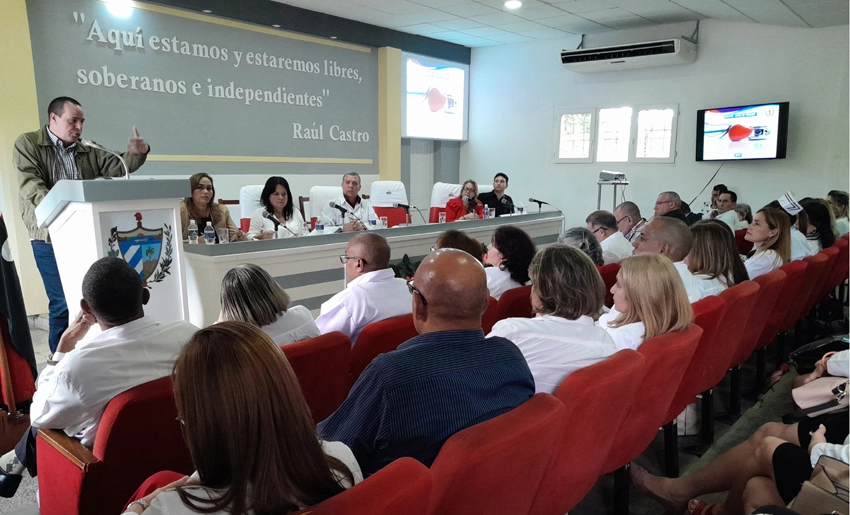The main indicators achieved in Public Health in Holguin and their behavior in 2023 were the focus of the analysis of the work management of this sector with the presence of minister, Dr. José Ángel Portal Miranda.
Last year was a period in which health professionals in the province had to face, among other difficulties, a shortage of resources, medical supplies and scarcity or low coverage of medicines.
The debate, which was also attended by a representation of the political and governmental authorities of the territory, began with the evaluation of the main modifications to the Public Health Law, which ratifies the economic and financial assurance of health services and introduces postulates contained in the Constitution of the Republic, other current regulations and international treaties ratified by the Cuban State; as well as the proposal of the concept of care, protection and recovery services.
During the meeting, the role of the academy in the training of health professionals was acknowledged, which has an enrollment of more than 8,900 students in the undergraduate and postgraduate modalities during the current academic year.
Nine specialties and one master’s program were evaluated as certified with results of excellence, and for the first time, 168 researchers were paid for their participation in projects.
During the period under review, health professionals in the territory received national awards from the Cuban Academy of Sciences, a Citma award to a young researcher and the Provincial Science, Technology and Innovation awards, while six researchers and two institutions received the Carlos Juan Finlay Order.
The main indicators of the sector show a 99.5 percent overall survival rate in Neonatology services, the third best infant mortality rate in the country with 4.7 per 1,000 live births and a reduction in premature mortality due to diabetes mellitus and cardiovascular diseases.
Other relevant results include the performance for the first time of a stool transplant in a critical maternal with pseudomembranous colitis and the declaration of the regional Oncology Center and Oncopediatrics Service as National Reference. Six diseases remained eliminated (poliomyelitis, diphtheria, measles, pertussis, rubella and mumps) and the severe clinical forms of neonatal tetanus and tuberculous meningitis in children under one year of age continue to be eradicated.
For the health sector, there are many challenges ahead and countless actions to be taken to improve the provision of services to the population, according to the head of the sector, “each institution must look inside to improve those indicators that are compromised. Holguín has a special significance for Cuban Public Health because of its professionals and the population it serves. Many have been the lessons of this period, we have not achieved everything we wanted.
“The challenge is to take advantage of what we have done well and channel our work that way. We need to make an effort on the part of our workers in view of the economic situation the country is facing. The future of Public Health is on our shoulders and we must continue to improve our strategic programs. We must improve the efficiency of services, solve the difficulties in the provision of services in the institutions and integrate the actions in each of the municipalities”.
Regarding the deficiencies identified, on which work should be focused this year, there is a need to make better use of the potential of the work groups for the development of educational work in the classroom; insufficient management of the subsystems of science by municipal methodologists and provincial institutions in terms of local development and the lack of correspondence of scientific production and categorization of researchers with the existing scientific potential.
In addition, the maternal mortality rate indicator, low birth and fertility levels, limitations for the diagnosis, treatment and follow-up of oncology patients, waiting lists and delay in the clinical stages for their care and non-compliance with indicators of hospital services and the non-functioning of 41 services in Primary Health Care due to equipment breakage were also compromised.
In this sense, Dr. Julio Yamel Verdecia Reyes, General Director of Public Health in Holguín, said that the work strategy for this year must offer a different look in the social institutions to achieve superior results. An increase in local productions of Natural and Traditional Medicine is foreseen as another component of treatment.
In primary health care, there should be a practical exercise of not stopping services for any reason, so that the people are not affected by the absence of health professionals at this level. Hospitals have a higher task in the promotion of their potential, training of human resources in deficient specialties and going towards a focus on prevention of chronic diseases that cause morbidity and lethality. In addition to control and efficiency in the rational use of resources.
Although it is not easy to respond to the problems of public health in the current context, it is an urgent need to contribute to improving health processes and strategies in order to guarantee the quality of services. To this end, it must be a priority to ensure the availability of medicines, medical technologies and pharmaceutical services that guarantee the functioning of the health system.
- The 4th edition of the Master’s Program in Natural Medicine will begin in Holguin - 16 de January de 2026
- Blood Bank Inaugurated at Holguin Military Hospital - 15 de January de 2026
- Holguin Cancer Center Plans to Incorporate Endoscopic Surgery in Urology - 14 de January de 2026

